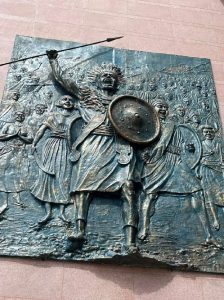
The Adwa Victory Memorial Museum stands as a testament to honor those who paid the ultimate sacrifice to defend their country’s territorial integrity and sovereignty from invading foreign armed forces.
It is widely recognized that during the late 19th century, European powers embarked on the scramble for Africa to divide the continent along ethnic lines and establish vassal states under their subjugation. However, in the case of Ethiopia, their conspiracy to control Ethiopia turned out to be a nightmare. Thanks to its brave children, by successfully resisting the advancement of colonial power and the ultimate price paid to safeguard its territorial integrity and independence, Ethiopia remained the only African nation that was never colonized by colonizers and a nation that can sustain its sovereignty.
It is a known fact that following the stratagem of European colonizers, many African nations found themselves under the yoke of colonial rule, with countries’ wealth and resources being stolen, local populations exploited for labor, and their cultures and languages suppressed. However, Ethiopia’s victory at the Battle of Adwa in 1896 marked a pivotal movement in the struggle against colonialism. As European powers sought to assert their dominance, Ethiopia stood firm and emerged victorious in a single day, reshaping the political landscape and garnering recognition as a sovereign state.
As preparations are underway to commemorate the Adwa Victory Day, the inauguration of the Adwa Victory Memorial Museum built in the heart of the capital Addis Ababa has captured headlines and hearts alike. Many view the museum as a symbol of freedom, sovereignty, unity that exhibits the struggle and sacrifice paid for independence. It also serves as a source of pride, strength, dignity and a beacon of hope for future generations.
According to Moges Temesgen, a resident of Addis Ababa and an expert in leadership and change management, the significance of the newly inaugurated Adwa Victory Memorial Museum in portraying the decisive point in the history of Ethiopia and Ethiopians is immense. Among others, it commemorates Ethiopia’s resistance against colonial power, portrays the indomitable spirit and unity of Ethiopians to safeguard their country from invading forces, as well as the magnitude of the Victory of Adwa. Equally important, it marks Ethiopia’s inspiration for Africans and Black people around the world for freedom.
He stressed that the Victory of Adwa was not only a military triumph counted against the invading Fascist Italy forces by Ethiopian patriots at the Battle of Adwa and heralded Ethiopia’s sovereignty, but it was also an incident that inspired freedom fighters across Africa and beyond to resist colonialists and fight for freedom.

The Museum’s exhibits, which include artifacts, documents, and photographs detailing the Battle of Adwa and Ethiopia’s struggle against colonialism, offer visitors a profound insight into the sacrifices made by Ethiopians from all walks of life. From the drum that heralded the war to the weapons and attire worn by patriots, each item serves as a reminder of Ethiopia’s resilience and determination.
Getnet Alebachew is a Junior School Teacher in Shoa Robit Town, North Shoa Zone of Amhara State. He also hailed the Museum as a fitting tribute to the fallen heroes of Ethiopians regardless of any differences. The Battle of Adwa did not only secure Ethiopia’s independence but also inspired the broader independence movement across Africa.
“In my view, the Adwa Victory Memorial Museum stands as a testament to Ethiopia’s enduring spirit and the continent’s collective struggle for freedom and sovereignty. By commemorating the triumphs and sacrifices of the past, it inspires future generations to uphold the values of justice, dignity, and unity,” he added.
According to him, the Museum could play a crucial role in preserving and passing down the history of Ethiopia and Africa, particularly regarding the Battle of Adwa.
It could also serve as a repository for historical artifacts, documents, photographs, and artworks related to the Battle of Adwa. These artifacts are carefully preserved and displayed, allowing visitors to directly engage with tangible pieces of history. By safeguarding these artifacts, the Museum ensures their long-term preservation for future generations.
In general, it will also let citizens and international visitors learn more about the Battle of Adwa and its significance. The Museum provides historical context, narrates the battle’s events, and explores its impact on Ethiopia, Africa, and the broader global context. Through exhibits, displays, and multimedia presentations, the museum helps visitors develop a deeper understanding of this pivotal moment in history.
It is clear that the Battle of Adwa holds significant historical and symbolic importance for Ethiopia and Africa. “We know it is a landmark event that demonstrates African resilience, resistance against colonialism, and the preservation of national sovereignty. Having this Museum could promote these narratives; foster a sense of national pride and Pan-African identity. It highlights the achievements of Ethiopian forces and their role in inspiring the then anti-colonial movements across the continent.”
He underlined that the Museum pays homage to the heroes and heroines who fought in the Battle of Adwa. It also highlights the contributions of key figures such as Emperor Menelik II, Empress Taytu Betul, and various military commanders and the deeds of the brave Ethiopians from all segments of society. By commemorating these individuals, the Museum helps to preserve their legacies and ensure that their stories are remembered and honored not only by Ethiopians but also the global community.
The construction of the Museum could provide opportunities for historians, academics, and researchers to study primary sources, conduct research, and contribute to the understanding of this historical event to the posterities. “I believe the Museum’s archives and library facilities could support scholarly inquiries and facilitate the production of new knowledge”, he underlined.
It is clear that the Museum will attract more tourists and visitors from around the world, contributing to cultural tourism and generating economic benefits for the local community, he said, adding that the Museum’s presence could encourage visitors to explore and learn about Ethiopians’ culture, and to engage in local businesses and services. This tourism-driven economic impact can support local development and in return paves ways in creating opportunities aside from contributing to the preservation of cultural heritage.
BY MENGISTEAB TESHOME
THE ETHIOPIAN HERALD THURSDAY 29 FEBRUARY 2024





